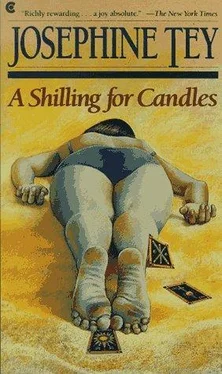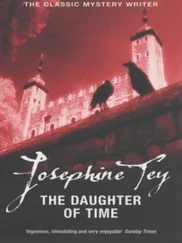Josephine Tey - A Shilling for Candles
Здесь есть возможность читать онлайн «Josephine Tey - A Shilling for Candles» весь текст электронной книги совершенно бесплатно (целиком полную версию без сокращений). В некоторых случаях можно слушать аудио, скачать через торрент в формате fb2 и присутствует краткое содержание. Год выпуска: 1936, Жанр: Классический детектив, на английском языке. Описание произведения, (предисловие) а так же отзывы посетителей доступны на портале библиотеки ЛибКат.
- Название:A Shilling for Candles
- Автор:
- Жанр:
- Год:1936
- ISBN:нет данных
- Рейтинг книги:4 / 5. Голосов: 1
-
Избранное:Добавить в избранное
- Отзывы:
-
Ваша оценка:
- 80
- 1
- 2
- 3
- 4
- 5
A Shilling for Candles: краткое содержание, описание и аннотация
Предлагаем к чтению аннотацию, описание, краткое содержание или предисловие (зависит от того, что написал сам автор книги «A Shilling for Candles»). Если вы не нашли необходимую информацию о книге — напишите в комментариях, мы постараемся отыскать её.
A Shilling for Candles — читать онлайн бесплатно полную книгу (весь текст) целиком
Ниже представлен текст книги, разбитый по страницам. Система сохранения места последней прочитанной страницы, позволяет с удобством читать онлайн бесплатно книгу «A Shilling for Candles», без необходимости каждый раз заново искать на чём Вы остановились. Поставьте закладку, и сможете в любой момент перейти на страницу, на которой закончили чтение.
Интервал:
Закладка:
"Rotten luck! And no redress. Maddening for you. Perhaps by next year the plants will have taken heart again."
"Oh, I'm selling the place. It's haunted. Had you ever met Clay? No? She was grand. They don't make that kind in pairs."
"Do you know of anyone who would be likely to want to murder her, by any chance?"
Hughes smiled one of the smiles which made his fans grip the arms of their cinema seats. "I know lots who would gladly have murdered her on the spot. But only on the spot. The minute you cooled off, you'd cheerfully die for her. It's most unlikely death for Chris — the one that happened to her. Did you know that Lydia Keats prophesied it from her horoscope? She's a marvel, Lydia. She should have been drowned when she was a pup, but she really is a marvel. I sent her Marie Dacre's year, day, and minute of birth from Hollywood. Marie made me swear an oath before she divulged the awful truth of the year. Lydia hadn't the faintest notion whose horoscope she was doing, and it was marvelously accurate. She'd be a wow in Hollywood."
"She seems to be heading that way," Grant said dryly. "Do you like the place?"
"Oh, yes. It's restful." As Grant raised his eyebrows: "There are so many pebbles on the beach that you're practically anonymous."
"I thought they ran rubbernecking tours for Midwest fans."
"Oh, yes, they run motor coaches down your street, but they don't tramp your flowers into the ground."
"If you were murdered they might."
"Not they. Murders are ten cents the dozen. Well, I must get along. Good luck. And God bless you. You've done me a power of good, so help me you have."
"I?"
"You've brought to my notice one profession that is worse than my own." He dropped some money on the table and picked up his hat. "They pray for judges on Sundays, but never a word for the police!"
He adjusted the hat at the angle which after much testing had been found by cameramen to be the most becoming, and strolled out, leaving Grant vaguely comforted.
Chapter 19
The person who wasn't comforted was Jammy. The buoyant, the resilient, the hard-boiled but bouncing Jammy. He had eaten at his favorite pub (black coffee might be all very well for worried police officials and actors who had to think of their figure, but Jammy dealt only in other people's worries and remembered his figure only when his tailor measured him) and nothing during lunch had been right. The beef had been a shade too "done," the beer had been a shade too warm, the waiter had had hiccoughs, the potatoes were soapy, the cabinet pudding had tasted of baking soda, and they were out of his usual cigarettes. And so his feeling of being ill-used and misunderstood, instead of being charmed away by food and drink, had grown into an exasperation with the world in general. He looked sourly over his glass at his colleagues and contemporaries, laughing and talking over the coarse white cloths, and they, unused to a glower on his brow, paused in their traffic to tease him.
"What is it, Jammy? Pyorrhea?"
"No. He's practicing to be a dictator. You begin with the expression."
"No you don't," said a third. "You begin with the hair."
"And an arm movement. Arms are very important. Look at Napoleon. Never been more than a corporal if he hadn't thought up that arm-on-chest business. Pregnant, you know."
"If it's pregnant Jammy is, he'd better have the idea in the office, not here. I don't think the child's going to be a pleasant sight."
Jammy consigned them all to perdition, and went out to find a tobacconist who kept his brand of cigarettes. What did the Yard want to take it like that for? Everyone knew that what you wrote in a paper was just eyewash. When it wasn't bilgewater. If you stopped being dramatic over little tuppenny no-account things, people might begin to suspect that they were no-account, and then they'd stop buying papers. And where would the Press barons, and Jammy, and a lot of innocent shareholders be then? You'd got to provide emotions for all those moribund wage-earners who were too tired or too dumb to feel anything on their own behalf. If you couldn't freeze their blood, then you could sell them a good sob or two. That story about Clay's early days in the factory had been pure jam — even if that horse-faced dame had led him up the garden about knowing Chris, blast her. But you couldn't always rise to thrills or sobs, and if there was one emotion that the British public loved to wallow in it was being righteously indignant. So he, Jammy, had provided a wallow for them. The Yard knew quite well that tomorrow all these indignant people wouldn't remember a thing about it, so what the hell! What was there to get sore about? That "hounding innocents to death" was just a phrase. Practically a cliche it was. Nothing in that to make a sensible person touchy. The Yard were feeling a bit thin in the skin, that was what. They knew quite well that this shouldn't have been allowed to happen. Far be it from him to crab another fellow's work, but some of that article had been practically true, now he came to think of it. Not the "hounding to death," of course. But some of the other bits. It really was something amounting to a disgrace — oh, well, disgrace was a bit strong; but regrettable, anyhow, that such a thing should occur in a force that thought it was efficient. They were so very superior and keep-off-the-grass when times were good; they couldn't expect sympathy when they made a bloomer. Now if they were to let the Press in on the inside, the way they did in America, things like that simply wouldn't happen. He, Jammy Hopkins, might be only a crime reporter, but he knew just as much about crime and its detection as any police force. If the "old man" were to give him leave, and the police the use of their files, he would have the man who killed Clay inside prison walls — and on the front page, of course — inside a week. Imagination, that's what the Yard needed. And he had plenty of it. All he needed was a chance.
He bought his cigarettes, emptied them gloomily into the gold case his provincial colleagues had given him when he left for London (it was whispered that the munificence was more the expression of thankfulness than of devotion), and went gloomily back to the office. In the front entrance of that up-to-the-minute cathedral which is the headquarters of the Clarion , he encountered young Musker, one of the junior reporters, on his way out. He nodded briefly, and without stopping made the conventional greeting.
"Where you off to?"
"Lecture on stars," said Musker, with no great enthusiasm.
"Very interesting, astronomy," reproved Jammy.
"Not astronomy. Astrology." The boy was turning from the shade of the entrance into the sunlit street. "Woman called Pope or something."
"Pope!" Jammy stood arrested halfway to the lift door. "You don't mean Keats, do you?"
"Is it Keats?" Musker looked at the card again. "Yes, so it is. I knew it was a poet. Hey, what's the matter?" as Jammy caught him by the arm and dragged him back into the hall.
"Matter is you're not going to any astrology lecture," said Jammy, propeling him into the lift.
"Well!" said the astonished Musker. "For this relief much thanks, but why? You got a 'thing' about astrology?"
Jammy dragged him into an office and assaulted with his rapid speech the placid pink man behind the desk.
"But, Jammy," said the placid one when he could get a word in edgeways, "it was Blake's assignment. He was the obvious person for it: doesn't he tell the world every week on Page 6 what is going to happen to it for the next seven days? It's his subject: astrology. What he didn't foresee was that his wife would have a baby this week instead of next. So I let him off and sent Musker instead."
"Musker!" said Jammy. "Say, don't you know that this is the woman who foretold Clay's death? The woman the Courier is running to give horoscopes at a shilling a time?"
Читать дальшеИнтервал:
Закладка:
Похожие книги на «A Shilling for Candles»
Представляем Вашему вниманию похожие книги на «A Shilling for Candles» списком для выбора. Мы отобрали схожую по названию и смыслу литературу в надежде предоставить читателям больше вариантов отыскать новые, интересные, ещё непрочитанные произведения.
Обсуждение, отзывы о книге «A Shilling for Candles» и просто собственные мнения читателей. Оставьте ваши комментарии, напишите, что Вы думаете о произведении, его смысле или главных героях. Укажите что конкретно понравилось, а что нет, и почему Вы так считаете.












